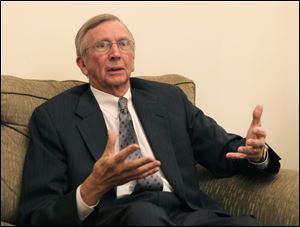
Thomas Moyer
4/6/2010THE death late last week of Chief Justice Thomas Moyer at age 70 marks the end of an era for the Ohio Supreme Court. During his 23 years as chief justice, Mr. Moyer oversaw significant changes in the composition and temperament of the court, as well as its physical surroundings and the manner in which it communicates and does its business.
After a stint as a political factotum to former Republican Gov. James Rhodes and 10 years of service on the state's 10th District Court of Appeals, Mr. Moyer dove into statewide politics in 1986. He ran against incumbent Democratic Chief Justice Frank Celebrezze in a bitter contest that was by far the most expensive Ohio judicial race to that point.
Mr. Moyer's victory over Mr. Celebrezze, who died last month, was a turning point for the court that eventually transformed what had been a 6-1 Democratic majority into a 7-0 Republican monopoly. Although his battle with Mr. Celebrezze raised partisanship to new levels in what is supposed to be a nonpartisan contest, Chief Justice Moyer worked to restore order, decorum, and collegiality to the high court.

Thomas Moyer
Not that his court was entirely without discord; the famous 1991 tussle between Justices Andy Douglas and Craig Wright left Mr. Douglas with three broken ribs. But no one ever questioned Mr. Moyer's honor or his commitment to doing what was right as he saw it.
Justice Moyer took over a court that ran much as courts had done for most of the 20th century. He leaves behind a court that for the first time has consolidated all its offices in one building, the renovated - and arguably extravagant - Ohio Judicial Center. He took charge of a court that still depended on paper and ink, and leaves a court that is fully of the digital age.
But it was the law that was most important to Mr. Moyer. Entering his final year on the bench - he was term-limited by his age - it was typical of his commitment to justice that he heard cases earlier last week even though he was not well.
Chief Justice Moyer will be remembered for presiding over several landmark cases, including the Supreme Court's 1997 decision that Ohio's system of funding public schools was unconstitutional. In 2006, the high court ruled for the first time in state history that governors can claim limited executive privilege.
Mr. Moyer undoubtedly felt some of his work was unfinished. He was an unsuccessful champion of eliminating politics from the selection of judges. He failed in his attempt to eliminate the "gotcha" brand of justice inherent in mayor's courts.
But there always will be work left for successors to do. It is a sufficient epitaph that Chief Justice Thomas Moyer truly cared about the Supreme Court, about the law, and about Ohio.